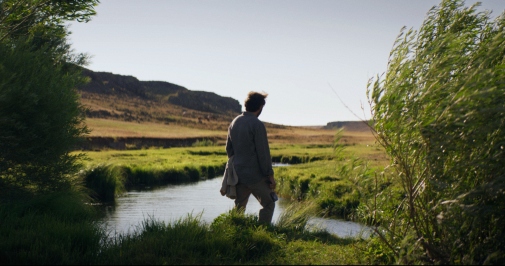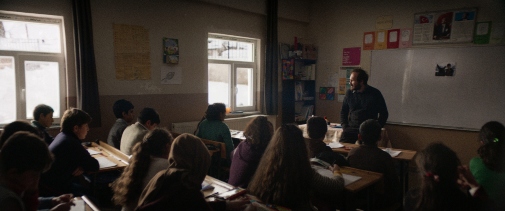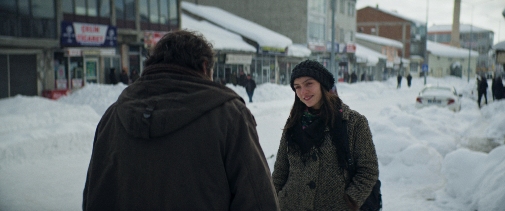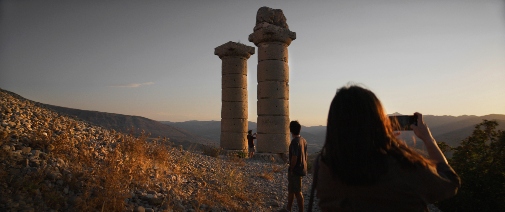by Nick Taylor

Are you, like the rest of us here at The Film Experience, furiously racing to catch up with some of last year’s most celebrated films before March 10th? Depending on where you live, there’s another certified banger making its way across the US and Canada this weekend. Nuri Bilge Ceylan’s About Dry Grasses likely made its biggest headlines out of Cannes for Merve Dizdar’s semi-surprising Best Actress prize against more internationally recognizable competition like the May December gals and newly Oscar-nominated Sandra Hüller. If you can believe it, Dizdar’s win is wholly deserving, and the film itself is remarkable…
Dizdar’s Nuray, one of several educators, school officials, and students who populate the film, is also a secondary role in Ceylan’s dense, novelistic drama. Our primary center is Samet (Deniz Celiloglu), a middle school teacher who’s spent the past four years teaching art at a public school in an isolated village in Eastern Anatolia. He’s coming to the end of his mandatory four-year service and he really, really doesn’t want to be there anymore. Samet originally hails from Istanbul, and has spent his entire time in Anatolia waiting for permission to leave. Living with fellow teacher Kenan (Musab Ekici) - a younger and handsomer fellow with the audacity to have hope and ambition for his profession - Samet gets by through nursing petty grudges and lavishing attention on his favorite students, a bright-eyed eighth grader named Sevim (Ece Bagci).

Separated by lightyears, Samet’s plight reminded me a bit of the bureaucratic humiliation visited upon Lucrecia Martel’s Zama, forever waiting for the order to rescue him from his purgatory and return him to the place of prominence he just knows is waiting for him. The 18th-century Argentinian output, humid with distortions yet utterly plausible, is replaced with the contemporary Anatolian snowscape. The barren, dry-snow winter that looks and sounds like you could cut your lips on a snowflake isn’t any more hospitable, further externalizing the deep resentment Samet always has simmering underneath his apparent detachment towards the rest of the world. His every glance betrays a reflex pity for others, analyzing if his conversation partners care too much about the world despite their worthlessness, or are just as pathetic as he knows they are.
Celiloglu’s infinitesimal gradations of bitterness, punctuated with warmth, curiosity, and rage in ways that always point towards his self-indulgent (self) loathing, gives About Dry Grasses the center it needs. It’s a tremendous feat to explore the depths of one man’s smallness across three and a half hours. And boy do we learn a lot, as Samet faces accusations of impropriety by an anonymous student (who is clearly Sevim) and becomes even more hostile in his classes. He also begins to spend more time with Nuray. Not after their blind date at the start of the film, of course not - what would he do with an activist? - but once it becomes obvious to him that she and Kenan are starting some kind of relationship, Samet decides to see what happens if he gets between them.
Celiloglu is absolutely in conversation with Ceylan’s ideas as a director and co-writer. Hell, he’s in conversation with Kürşat Üresin and Cevahir Şahin’s cinematography, fully aware of how to transmit Samet’s interiority no matter where he’s placed in the camera. Best of all, he’s in sync with the rest of the cast, making sure Samet’s narcissism never blocks the actor or the character from reacting fully to their scene partner. Ece Bagci gives one of the year’s most prodigious child performances, communicating a bright, gregarious student whose infatuation with her teacher is utterly shattered when she catches him reading a love letter confiscated from her bag. Dizdar enters the film as a sharp, piquant presence, and expands our understanding of Nuray as thoroughly as Celiloglu does for Samet. Every performance pops off the screen with casual, novelistic depth, communicating their roles via telepathic stillness and uncanny modulations of tone, comportment, and dialogue.

I am a bit surprised to realize how much of this review has praised the film as an acting showcase, when so much of my reactions in the moment related to the trajectories in the storytelling, the heaviness of the running time and scope, the merciful, tightly controlled, and unexpectedly rich dark humor percolated through the whole project. The actors are indeed essential to making About Dry Grasses into such an indelible experience, yet the film’s text and images reveal so many ideas that would translate even amongst a weaker cast. Samet’s prematurely middle-aged sense of emptiness, his utter listlessness in all causes except bringing everyone else down to his level, in virtually every character’s movements to find and keep their corner of the world intact, is mightily felt.
Seasons change. Assholes compose simplified reveries for the person they were and the caricatures they imagine their compatriots have become. The petty, day-to-day trudges of being who you need to be now so you can maybe, just maybe get what you want later, is so recognizable. Ceylan’s empathy goes a long way to making About Dry Grasses into such an absorbing feature, not in spite but because of the three and a half hours we spend with this total jag. No one’s “just” who they say they are, or who they want to be. People are complex! At the same time, recognize when the contemptuous, unhappy leech in the room is not having a bad day, or bad month, or bad year. He’s just a leech, and I’m sure Samet will be just as miserable and creepy in Istanbul as he was in Anatolia.

About Dry Grasses is currently enjoying a limited release in American theaters, with distribution by Janus Films.